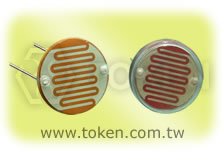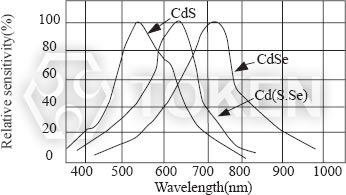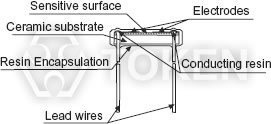
CDS Photoresistors (PGM)
Light-Dependent Photoresistors for Sensor Applications.
The cadmium sulfide (CdS) or light dependent resistor (LDR) whose resistance is inversly dependent on the amount of light falling on it, is known by many names including the photo resistor, photoresistor, photoconductor, photoconductive cell, or simply the photocell.
A typical structure for a photoresistor uses an active semiconductor layer that is deposited on an insulating substrate. The semiconductor is normally lightly doped to enable it to have the required level of conductivity. Contacts are then placed either side of the exposed area.
The photo-resistor, CdS, or LDR finds many uses as a low cost photo sensitive element and was used for many years in photographic light meters as well as in other applications such as smoke, flame and burglar detectors, card readers and lighting controls for street lamps.
Providing design engineers with an economical CdS or LDR with high quality performance, DeMint Electronics now offers commercial grade PGM photoresistor. Designated the PGM Series, the photoresistors are available in 5mm, 12mm and 20mm sizes, the conformally epoxy or hermetical package offer high quality performance for applications that require quick response and good characteristic of spectrum.
DeMint has been designing and manufacturing high performance light dependent resistors for decades. Our product offerings are extensive and our experience with custom photoresistor is equally extensive. Contact us with your specific needs.
Download complete specification - Cds Photoresistors.
- Quick Response
- Reliable Performance
- Epoxy or hermetical package
- Good Characteristic of Spectrum
- Photoswitch
- Photoelectric Control
- Auto Flash for Camera
- Electronic Toys, Industrial Control
Terminology (PGM)

CdS Photoresistors (PGM) Spectral Response

CdS Photoresistor (Light Dependent Resistors) - PGM Series
- Light Resistance :
Measured at 10 lux with standard light A (2854K-color temperature) and 2hr. preillumination at 400-600 lux prior testing. - Dark Resistance :
Measured at 10th seconds after closing 10 lux. - Gamma characteristic :
Under 10 lux and 100 lux and given by
γ = log(R10/R100) / log(100/10) = log(R10/R100)
R10, R100: resistance at 10 lux and 100 lux.
The tolerance of γ is ±0.1. - Pmax :
Max. power dissipation at ambient temperature of 25°C.At higher ambient temperature,the maximum power permissible may be lowered. - Vmax :
Max. voltage in darkness that may be applied to the device continuously. - Spectral peak :
Spectral sensitivity of photoresistors depends on the wavelength of light they are exposed to and in accordance with figure 'Spectral Response'.
The tolerance of spectral peak is ±50nm.
| Physical and Environmental Characteristics (PGM) | ||
| ITEM | CONDITIONS | PERFORMANCE |
| Solderability | Put the terminals into welding tank at temp. 230±5°C for 2±0.5s (terminal roots are 5mm away from the tin surface). | wetting>95% |
| Temperature Changing | Change of temperature in accordance with: TA: -40°C TB: +60°C Number of cycles: 5 Exposure duration: 30min | Drift of R10 = ± 20% No visible damage |
| Constant humidity and heat | 1. Put the device in test box at Temperature: 60±5°C Humidity: 90-95% Illumination: 0lux Duration: 100h 2. Take the device and measure after24h at normal temperature and humidity. |
Drift of R10= ± 30% No visible damage |
| Constant load Temperature | At 25±5°C Illumination: 150lux at rated power Duration: 600h |
No visible damage |
| Wire Terminals Strength | Bend the wire terminal at its root to 90 degree,and then bend it to a opposite direction. | No visible damage |
| Vibration | Frequency: 50Hz Swing: 1.5mm with Directions: parallel to ceramic substrate normal to ceramic substrate. Duration:2h |
No visible damage |
| Order Codes (PGM) | ||||
| PGM5516 | P | |||
 |
 |
|||
|
|
|||